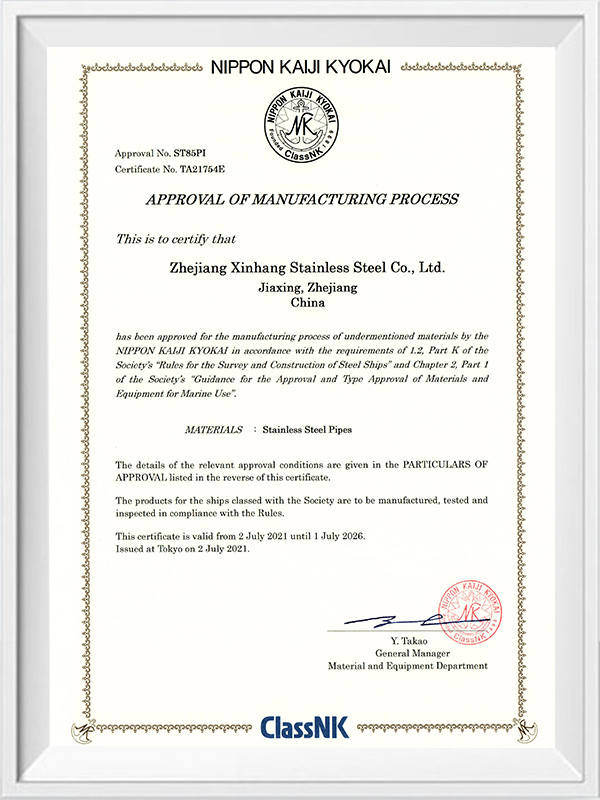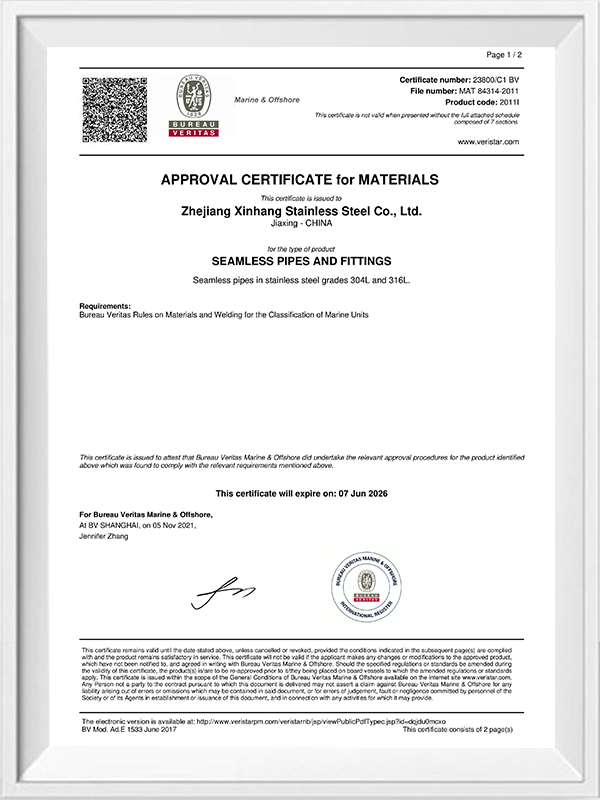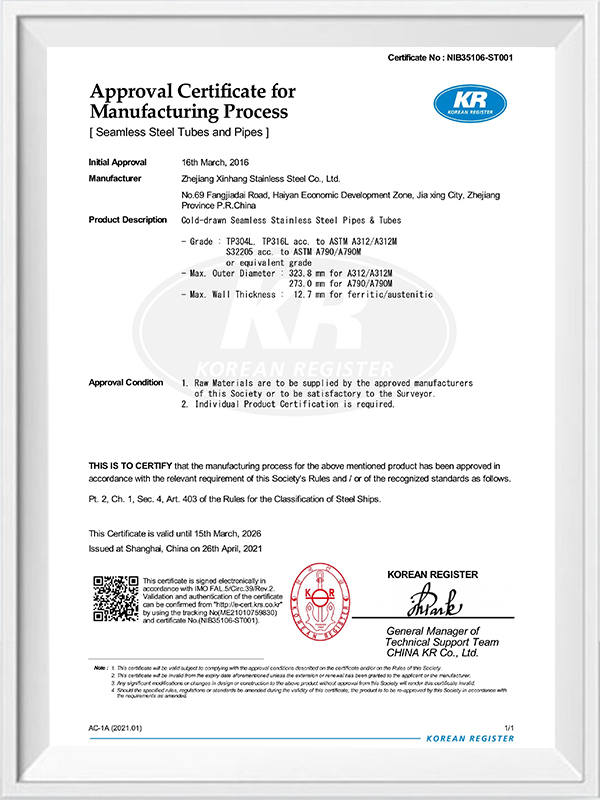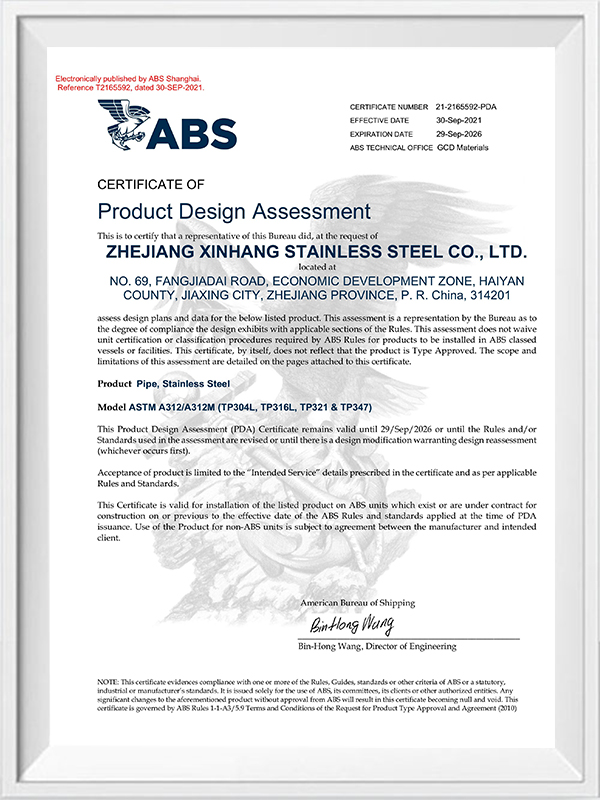

Xinhang Special Material Co., Ltd. Hangzhou Branch is China stainless steel pipes for industrial fluid transportation Manufacturers and stainless steel pipes for industrial fluid transportation Factory, founded in 2007 and moved to Longyou Economic Development Zone, Zhejiang Province, in 2022. It covers an area of 130,000 square meters, more than 30 production lines, 300 workers, 20 R&D people, 30 inspection people and an annual output of 50,000 tons.
It has passed ISO9001:2008 quality management system, PED 97/23/EC EU Pressure Equipment Directive certification, China Special Equipment Manufacturing License (Pressure Tube) TS certification, ASME certification, provincial enterprise standardization management system, ISO14000:2004 environment management system, cleaner production (green enterprise), and a series of certifications, as well as China Classification Society (CCS), American Bureau of Shipping (ABS), British Register of Shipping (LR), Deutsche Veritas (GL), Bureau Veritas Society (BV), Det Norske Veritas (DNV), and Korean Register of Shipping (KR) factory certification.
The main products include stainless steel pipes, pipe fittings, flanges, valves, etc., which are widely used in petroleum, chemical industry, nuclear industry, smelting, shipbuilding, pharmaceuticals, food, water conservancy, electric power, new energy, mechanical equipment, and other fields. The company adheres to the corporate tenet of "quality for survival, reputation for development" and wholeheartedly serves every customer to create a win-win situation.




Bottom line: how to weld stainless steel pipe without sugar and leaks For most stainless steel pipe work, the most reli...
View MoreDirect answer: what a “stainless steel pipe pressure rating” really means A stainless steel pipe does not have one univ...
View MoreIn our shop, bending stainless steel pipe is one of those operations that looks simple but punishes shortcuts. Stainless...
View MoreWhat SCH 10 stainless steel pipe specifies (and what it doesn’t) In piping specifications, “SCH” (schedule) is shorthan...
View MoreWhat standards govern the manufacturing and quality control of stainless steel pipes for fluid transportation?
The manufacturing and quality control of stainless steel pipes for fluid transportation are governed by several standards established by prominent organizations worldwide. These standards provide specifications and guidelines to ensure the reliability, safety, and performance of stainless steel pipes across various industrial applications. For instance, ASTM International issues standards such as ASTM A312/A312M for seamless, welded, and heavily cold-worked austenitic stainless steel pipes, while ANSI offers standards like ANSI B36.19 specifically for stainless steel pipes for industrial fluid transportation dimensions. Additionally, international standards like ISO 3183 and EN 10216 address the technical delivery conditions for steel pipes in pipeline transportation systems. Compliance with these standards is crucial for manufacturers, suppliers, and users alike to uphold the quality and integrity of stainless steel pipes throughout their lifecycle, ensuring they meet the rigorous demands of fluid transportation in diverse industrial settings.
These standards cover various aspects such as material composition, dimensions, manufacturing processes, testing methods, and quality control measures to ensure the reliability, safety, and performance of stainless steel pipes for fluid transportation in different industries and applications. Compliance with these standards is essential for manufacturers, suppliers, and users to maintain the integrity and quality of stainless steel pipes throughout their lifecycle.
How resistant are stainless steel pipes to corrosion from various industrial fluids?
Stainless steel pipes are renowned for their exceptional resistance to corrosion from various industrial fluids, making them a preferred choice for fluid transportation in demanding environments. The corrosion resistance of stainless steel is primarily attributed to its alloy composition, typically containing chromium, nickel, molybdenum, and other elements that form a protective oxide layer on the surface of the material. This oxide layer acts as a barrier, preventing further corrosion and enhancing the longevity of the pipe.
The degree of corrosion resistance can vary depending on the specific grade of stainless steel and the chemical composition of the fluid being transported. In general, stainless steel pipes exhibit excellent resistance to corrosion from common industrial fluids such as water, steam, acids (e.g., sulfuric acid, nitric acid), alkalis, and various organic compounds.
However, certain aggressive environments, such as those containing highly concentrated acids or chlorides, may require the use of specialized grades of stainless steel or additional corrosion protection measures. For example, duplex stainless steels, which contain higher levels of chromium, molybdenum, and nitrogen, offer superior resistance to chloride-induced stress corrosion cracking and are often employed in applications involving seawater or chloride-rich environments.
Overall, the corrosion resistance of stainless steel pipes for industrial fluid transportation makes them well-suited for a wide range of industrial fluid transportation applications, providing reliability, durability, and minimal maintenance requirements even in challenging operating conditions. Regular inspection and maintenance practices are still recommended to ensure optimal performance and longevity of stainless steel piping systems.
We'll never share your email address and you
can opt out at any time, we promise.